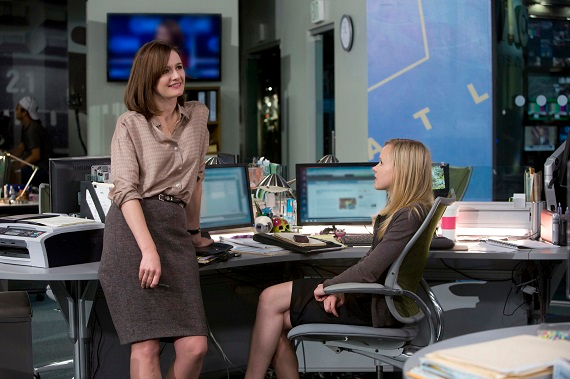
The Bechdel Test, while not, admittedly, without its detractors, should be in the back of mind of any men who write female characters. I first became aware of it about a year or so ago and it is quite amazing how many fictional works don’t live up to its very simple requirements. The cartoonist Alison Bechdel who created it in 1985 describes it as follows: the creative enterprise (film, play, novel, what-have-you) has to have at least two women in it who talk to each other about something other than a man. Watching this week’s The Newsroom last night I found myself thinking of the Bechdel Test and how the episode (“The Genoa Tip”) failed it. There were at least four scenes involving two women speaking to one another, but on each occasion the subject was a man or men in general – even dropped into conversations that ostensibly had nothing to do with dudes. Sloan and Maggie, Maggie and Lisa, Maggie and Mac – men hovered invisibly between them as both sub- and super-text. You couldn’t help but shrug, especially since the show keeps replaying the clip of Maggie teeing off on Sex and the City (in the form of an embarrassing YouTube video) for its depiction of women who have nothing better to do than talk about men.
It’s important to remember that the Bechdel Test is not an absolute for judging whether something is worthy of your time. For example, The King’s Speech fails the Bechdel Test because the plot focuses on the bond between two men and the only conversation between two female characters in the movie is also about them. Perfectly serviceable material nonetheless, and the theme of the story transcends gender. But it’s disappointing when a television series in particular that features ostensibly strong, professional female characters can’t get them talking about anything other than guys they’re dating/want to date/love from afar/can’t stand the sight of. Most women I know define themselves and the scope of their lives far beyond the parameters of their romantic relationships, or lack thereof as the case may be. They are people of greater substance than the boy-crazy constructs our screens and e-readers tend to be littered with. The problem is that success, as defined by (largely male-driven, let’s be honest) popular culture, means very different things for the sexes. The man wins the big game, scores the important account, kicks the villain off the precipice to his doom. The woman gets Prince Charming and the happily ever after.
The key to starting off any story is figuring out what the character wants. What’s interesting is that for most male characters, “getting the girl” is almost always the secondary goal. In any James Bond movie that consideration comes only after the cat-stroking baddie’s plan to blow up the world has been thwarted. By contrast, “getting the guy” is usually the primary goal for a female protagonist, and her professional goals (if there are any) are depicted as less important in the face of the possibility of true love. (In stories where getting the girl is the man’s primary goal, said “getting” often means “getting between the sheets with” and an apple pie’s honor gets besmirched in the process.) It therefore follows, given this premise, that conversations between characters, whether the same gender or not, would be oriented exclusively towards the pursuit of the primary goal. In the case of two women speaking to one another, this means the subject will be a man and/or men, and thus, bzzzzt! Bechdel Test fail.
No one is suggesting that we should stop writing love stories, or, more to the point, stories where love is all you – man or woman – need, or want. Love is so indelibly part of the human experience that to expect otherwise is unrealistic. It behooves us though, particularly male authors, to consider the Bechdel Test as we craft the interactions of our characters. It’s a premise as simple as the old advice about avoiding clichés. Instead of writing lazily that something is “as black as night” or comparing the blackness of said object to coal or ravens, force yourself away from those hoary old examples toward something new. Likewise, if you’re writing a conversation between two women, say to yourself from the outset that the subject of men is verboten and see where the words take you instead, once you manhandle them (pun intended) onto a different path. Yes, a large portion of “The Genoa Tip” was devoted to the aftermath of Maggie’s breakup with Don, the implosion of her friendship with her roommate over her now-very-public feelings for Jim and so on, but did a perfectly reasonable and professional discussion between Maggie and Mac over whether or not Maggie could go to Uganda on assignment have to be spoiled by Mac’s unnecessary comment about Will’s doucheyness? I may be picking nits a little, but when the episode (and indeed, much of the series to date) had already ventured so deeply into Bechdel-fail territory it was just one tiptoe too far.
Ultimately, the lesson of the Bechdel Test, and why I consider it useful in approaching fiction (and even non-fiction opinion pieces such as this one) is this: there is far more to a woman, and to women, than the men they fall in or out of love with, and our stories about them should reflect that.

Loved this. So true and not enough people understand the Bechdel Test.
Thank you! As I said it’s not an absolute but a useful guide and an important lesson about how women are portrayed in fiction – the idea of the primary and secondary goal and how they are flipped depending on the gender.
Would making the women characters lesbians help solve this problem? 😀
Heh – perhaps! But they’d still be talking about their relationships though as their primary goal.
Not necessarily. It’d just still be something to watch out for.